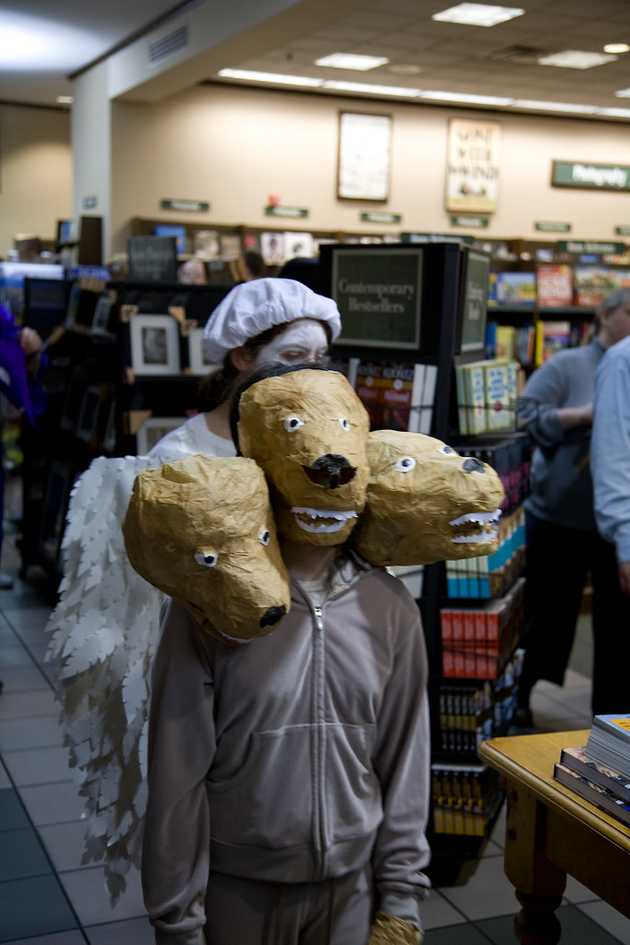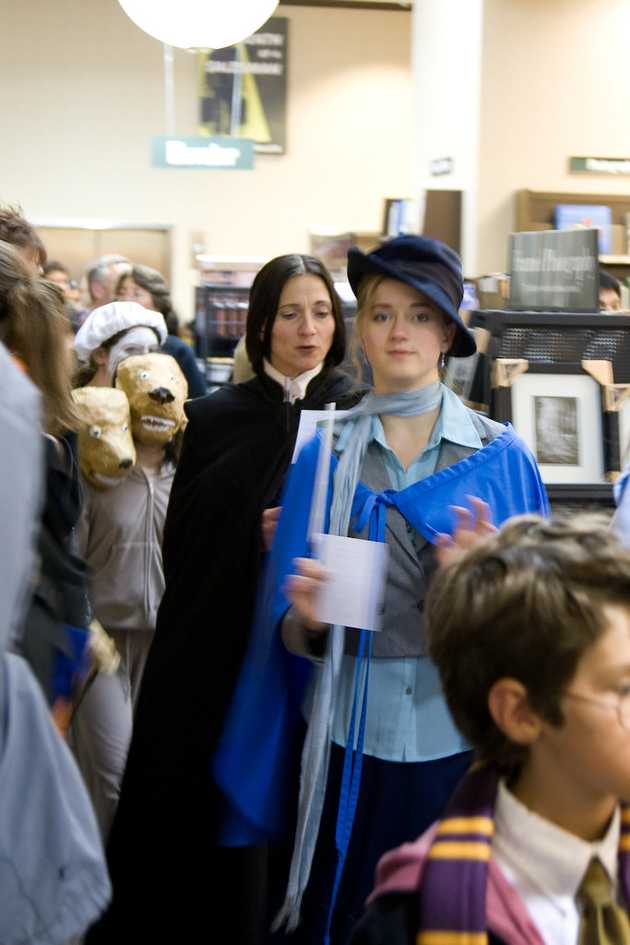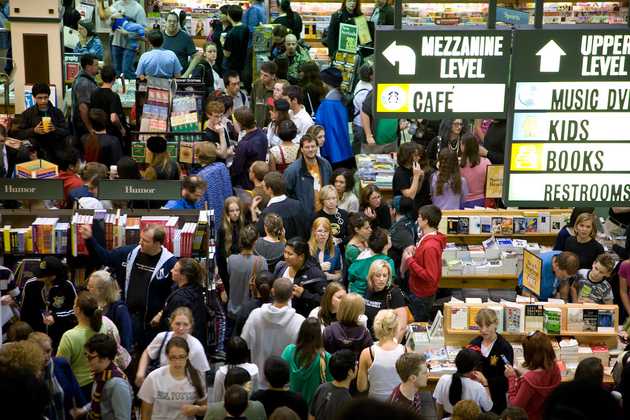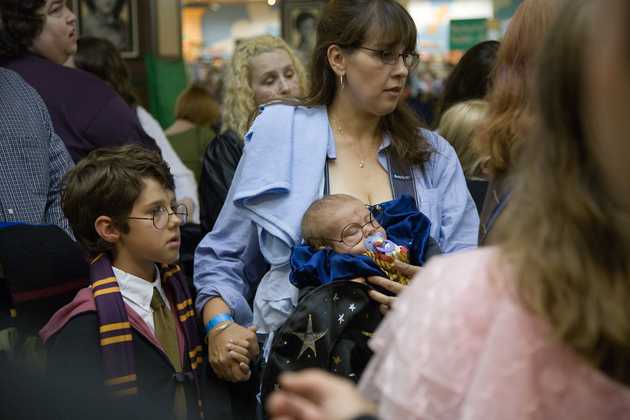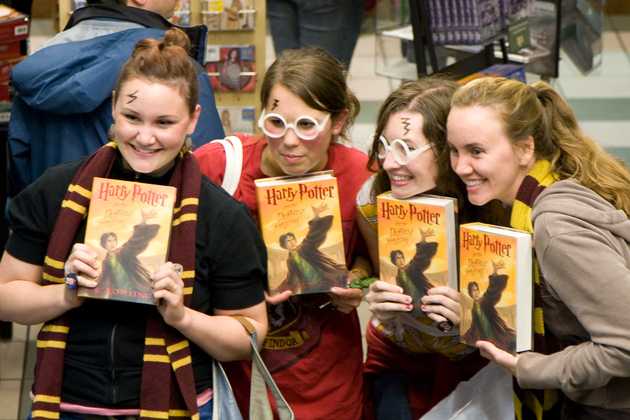For the past couple of months, I would walk past Barnes & Noble after dropping Alex off at daycare, on my way to pick up coffee at Starbucks. Each time I walked by the store, I’d think, “Harry Potter is coming soon!” I’d remember being at the midnight release party for Harry Potter and the Half-Blood Prince two years earlier, at that same Barnes & Noble, and I’d get excited imagining the scene at the upcoming release party.
I did spend a couple of hours at Barnes & Noble on July 20th, securing my spot in line, checking out the decorations, and admiring the crowds and the costumes. I found the experience heartwarming and exciting. I’ve grown up with books and always known they were important. The mobs of witches and wizards and three-headed dogs at Barnes & Noble on a drizzly midnight showed how many other people think books are important, too.
By 12:10 AM on the 21st, I had my copy of the book, and I finished reading it by 10:00 PM. That was 22 hours after buying the book, and almost nine years after first reading Harry Potter and the Sorcerer’s Stone. Once I finished the book — which I loved — and its spell started wearing off, I had a hard time explaining why Harry Potter made me so excited. It’s not my favorite book. (I’d have a hard time picking between To Kill a Mockingbird, The Name of the Rose, Love in the Time of Cholera, King Lear, or Atonement for the “favorite book” title.) It’s not the most detailed alternate universe I’ve encountered. That’s clearly The Lord of the Rings. It’s not even my favorite children’s fantasy series. I think Lloyd Alexander’s The Chronicles of Prydain (now almost 40 years old!) are still the best.
So what is it?
First, I think the Harry Potter phenomenon shows how powerfully stories affect our emotions. Judging from the comments I’ve read on the internet, hundreds of thousands of people around the world were crying this past weekend because of the deaths in The Deathly Hallows. It doesn’t matter that, in fact, there were no deaths — because, in fact, these aren’t real people we’re talking about. Stories seem real to us. We want them to be real. And our emotions respond to a good story the same way they respond to reality. The emotional response lasts past the end of the novels, spilling over to color how readers respond to language itself. For example, anybody who’s made it through all seven books can’t read the word Hogwarts without getting that warm, comforting feeling associated with home; can’t read the word Voldemort without a feeling of dread; can’t read the nonsense phrase Expecto Patronum without feeling a sense of protection.
(Tim O'Brien makes this point better than I ever could in "[How to Tell a True War Story](http://www.stg.brown.edu/projects/WritingVietnam/readings/tob_true_war.html)" in [The Things They Carried](http://www.shelfari.com/books/11959/The-Things-They-Carried). Every lover of fiction should read that story -- but be warned it's not for the faint-hearted.) > >
While readers will bond with any good story, I think that bond has been particularly strong with Harry Potter because it has developed over such a long stretch of time. As I look around my bookshelf, I don’t see any other fictional universe that has rolled around in my head, off and on, for anywhere close to the nine years I’ve been visiting Hogwarts. I’ve spent over a quarter of my life waiting for the next Harry Potter book to come out. For the younger readers, the connection must be even stronger because they have grown up as Harry has grown up.
I wager that for bookworms like me, the books read during childhood and adolescence are more important than anything except family and close friends in shaping the kind of person you grow up to be. When I look back on my childhood, I can see how books like To Kill a Mockingbird and The Chronicles of Prydain influenced my sense of right and wrong — those stories are deeply etched on my adult personality. What must it be like to grow up with Harry Potter? As with To Kill a Mockingbird, children who grow up reading Harry Potter will see that someone’s worth doesn’t depend on heritage or race. Children who grow up reading Harry Potter will see the power of love, of sacrifice, and of friendship. They will see how the fear of death corrupts, or threatens to corrupt, everybody from Voldemort to Dumbledore. Many of these are timeless themes that are as old as literature. But unlike the books I grew up with, this series straddles the pre-9/11 and post-9/11 worlds. The post-9/11 Harry Potter books show what it is like to deal with people who are pure evil and who deftly use terror to gain power. The books warn against both pretending that the problem doesn’t exist (Cornelius Fudge), and also against using torture and other inhumane ways of trying to combat your enemies (Dolores Umbridge). So this is J.K. Rowling’s greatest achievement — she’s created a modern series that’s worth growing up with. I can’t wait for my son to be old enough to read these books and let them influence him the way books influenced me when I was young.
